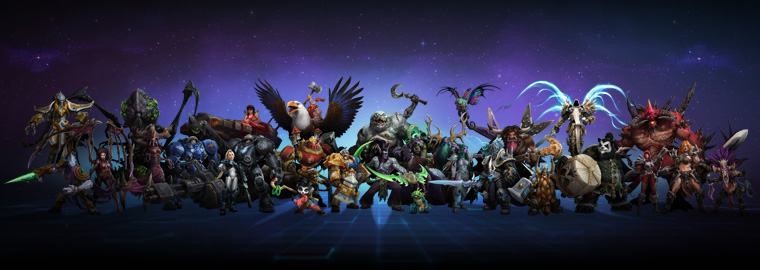Recently a friend of mine encouraged me to join him in playing a competitive online game, where individual ability is overshadowed by team cohesion and contribution – but one in which a single poor player or ill-executed decision can easily throw an entire match. Three of his five-person team have played this game for four+ years each, with myself and another as the very new kids on the block. I’ve played, and often enjoyed, most genres of computer games out there, but a lane-defense team battle was a new one for me.
In addition to learning an entirely new gaming lexicon (“laner,” “dive comp,” “tap,” “rotate,” “face-check,” and a myriad of other phrases excitedly uttered over voice communications), the unique features of about a dozen maps, and the specific mechanics of the 3-5 characters they thought I should give a serious try, I also had to intuit what had become standard in high-level play on my first day. The game’s matchmaking system attempts to keep teams on a near 50/50 win/loss ratio, but I can certainly say that at the start I contributed much more often to our team falling behind than pulling ahead.
Without getting too deeply into the mechanics of the game, it boils down that some characters are better at fighting NPCs, some providing team support, some trapping other players, and so forth. Most of the characters they had me play fulfilled an important role of keeping the NPC armies away from our castle, while they went and dealt with the other players. Over our voice chat I heard near-continual critique and praise (admittedly, more often the former) between my team, the four of them working to defeat the opposing players. Off in largely uninhabited areas, I was neither getting much feedback – positive or negative – nor gaining any experience fighting in a group, which is nominally a staple of the game.
All I really had to go on was the experience I’d garnered through other games, and the ability to at least pick up the idea of how different characters worked, and in my mind, the lack of criticism I was getting from my team was solely due to the fact that I was the friendly new guy and they didn’t want to scare me off. Even side comments like “you’re way better than I was after a month” or similar rang as false or patronizing (again, just to me; they were meant genuinely). In most games I tend to play loners, people who go off and do their own thing – a trend I’ve recently become well-aware of in my own writing, as well. Being off on my own and trusting the team to tell me if they needed me to do something different was both familiar and frustrating, because I couldn’t genuinely gauge if I were actually helping the team, with the Catch-22 of not wanting to ask, in case the answer was negative.
Last night we had a game with good teamwork and a few very interesting tactics by both sides, and one of the senior players kept a recording of the match, to see where he (in specific) or we (in general) could improve. Tonight one of the first things he said to me as we logged in for a quick match or two, was that he had watched about 10 straight minutes of me playing, as he was going through the replay, and there was functionally nothing he could complain about – that I had a good handle on that character and what my role was on that map. He praised my initiative in taking calculated risks and how I contributed to the overall team victory, even if I weren’t nearby.
A player who has been deeply involved in the game for more than four years, complimenting my performance while playing on his team? In my brain, his comments were like water off a duck – scarcely remembered save to warrant writing this entry. The entire time I’ve played this game, and engaged in so many other activities in my life, my default presumption is that I’m the cause of failure, or at least the cause of not achieving as much as was possible. Rarely am I yelled at during our matches, even as we stumble through painful league games, and while my rational side figures that’s because I’m doing what is expected of me, my emotional side figures it’s because there’s not much point in coaching or improving me – that I merely happen to be a “not-awful” player that’s in their team because of my buddy.
When I hop on to play without my friend and his team, it’s so I can hopefully improve and not be as bad during our next game, rather than out of my own sense of joy at playing. For me it’s about getting up to a “good enough” standard that, knowing me, will perpetually be out of reach due to my own unrealistic expectations.
It really chafes me that my default mindset is “I’m not good enough,” and I see that thread running very continuously through my life, be it interactions in the workplace, at home, or in my extracurricular activities. Being aware of it is the first step to dealing with it, I know, but it’s a difficult process, and one I presume will take a life of trying to work at.















